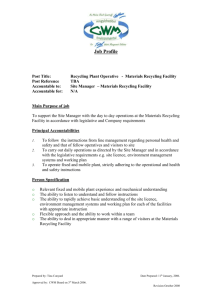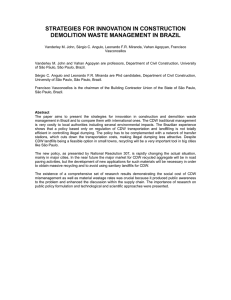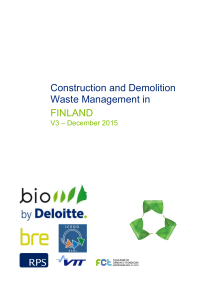Construction Demolition Management in Lebanon
advertisement
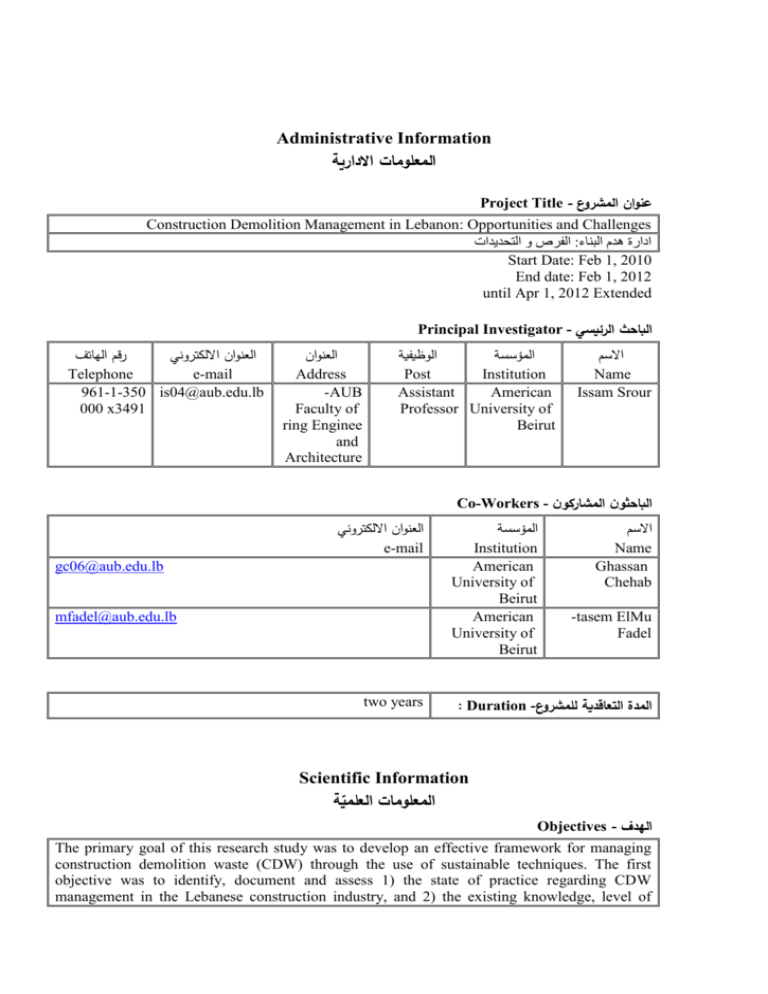
Administrative Information المعلومات االدارية Project Title - عنوان المشروع Construction Demolition Management in Lebanon: Opportunities and Challenges الفرص و التحديدات:ادارة هدم البناء 0b 2b 1 be: :et t rStS 21 be: :et t rStr 21b2 1 2 t rStr 2ebe1 e Principal Investigator - الباحث الرئيسي رقم الهاتف العنوان االلكتروني Telephone e-mail 961-1-350 is04@aub.edu.lb 000 x3491 العنوان Address -1 t : r2 be sn 221n 21n21ee 1 12rt2berb22e الوظيفية Post 1oo2ob 1b r2sneoos2 المؤسسة Institution 1Se22r 1 12 e2o2be sn te222b االسم Name roo S 02s22 Co-Workers - الباحثون المشاركون العنوان االلكتروني e-mail gc06@aub.edu.lb mfadel@aub.edu.lb brs ee 2o المؤسسة Institution 1Se22r 1 12 e2o2be sn te222b 1Se22r 1 12 e2o2be sn te222b االسم Name t oo 1 btet t -b oeS 2 u2 : e : Duration -المدة التعاقدية للمشروع Scientific Information العلمية المعلومات ّ Objectives - الهدف The primary goal of this research study was to develop an effective framework for managing construction demolition waste (CDW) through the use of sustainable techniques. The first objective was to identify, document and assess 1) the state of practice regarding CDW management in the Lebanese construction industry, and 2) the existing knowledge, level of awareness, and recycling practices amongst the different stakeholders (owners, designers, contractors, government etc). The second objective was to investigate the technical feasibility and quantify the costs and benefits (economical and environmental) of recycling, reusing, and proper landfilling through case studies in Lebanon. These two steps will serve as the basis for developing a decision-making model for selecting and implementing the appropriate CDW management technique. Achievements -أالنجازات المحققة In one of the published papers, the research team identified, documented, and assessed the existing levels of awareness and implementation of sustainability practices amongst the different participants in the Lebanese construction industry. The analysis was based on a survey of owners, designers, and contractors supplemented with four case studies illustrating the recycling of CDW. The results indicate an acceptable level of awareness, but a mediocre level of implementation of sustainable practices which were limited to green design efforts and uncoordinated attempts at recycling construction demolition materials. A theoretical framework has been proposed to manage CDW in the context of Lebanon. A cost-benefit analysis was carried out for various recycling scenarios. The analysis demonstrated the feasibility of a CDW recycling facility. Land price and property depreciation in residential urban areas play a vital role in siting a recycling facility, particularly where land is scarce such as the case in most urban areas. Once a site is located, the recycling gate fee and the aggregate selling price must be defined in a way that allows recyclers to compete against the cost of the raw material and more importantly provide adequate incentive for contractors to opt for managing CDW through the recycling facility by raising the landfill tipping fees. A regulatory framework should be concurrently adopted and properly enforced in order to protect the recycling market. Implementing a waste management plan requires not only technical and financial considerations but also a clear statement of roles and responsibilities of corresponding authorities. Accordingly, a proper action plan should be in place to specify the roles of various stakeholders. Such a plan relies on four components : (1) legislative measures that advocate proper handling of CDW, (2) implementation measures within concerned ministries, (3) financing through either public or private institutions, and (4) monitoring and control. Perspectives - آفاق البحث As shown in the published papers resulting from this generous grant, recycling of construction demolition waste is economically feasible. In particular, building and operating a recycling plant for cementitious material can have substantial economical and environmental benefits. The research team would like to build on the encouraging results, and is in the process of drafting a proposal for a research study which tackles waste streams during the construction process. This is a problem of particular importance to Lebanon, which features an active construction market and limited landfill spaces. Publications & Communications - المنشورات والمساهمات في المؤتمرات Srour, I.M., Chehab, G.R., and Gharib, N. (2012). “Recycling Construction Materials in a Developing Country: Four Case Studies.” Accepted for Publication, Special Issue on Recent Development in Engineering Systems Management: Proceedings of the ICESMA 10 Conference, International Journal of Engineering Management and Economics. Srour, I.M., Tamraz, S., Chehab, G.R., El-Fadel, M. “A framework for managing construction demolition waste.” Under Review, Resources, Conservation & Recycling, Submitted Jan. 2012. Srour, I.M., Tamraz, S., Chehab, G., and El-Fadel, M. (2012). “A Framework for Managing Construction Demolition Waste: Economic determinants of recycling.” Accepted for presentation and publication at the Construction Research Congress, ASCE, West-Lafayette, IN, May 21-23. Tamraz, S.N., Srour, I.M., and Chehab, G.R. (2011). “Construction Demolition Waste Management in Lebanon.” Proceedings of the 2011 International Conference on Sustainable Design and Construction, held in Kansas City, Missouri, March 23-25, Eds (Wai Kiong Oswald Chong and Christopher Hermreck), ASCE, Construction Institute. Abstract - موجز عن نتائج البحث The significant amount of waste generated from construction demolition has become a chronic problem in many developing countries. Using data obtained from demolition contractors and various other sources, this research study proposes a framework for proper handling of construction demolition waste (CDW) to serve as a decision support tool in countries suffering from the lack of national CDW management guidelines. The framework is then demonstrated through a case study in the city of Beirut, Lebanon, and a sensitivity analysis is carried out to examine the economic feasibility of developing a recycling facility. The analysis showed that in order for a facility to be feasible, a gate fee should be charged in the presence of a market for recycled aggregates. The results confirm the significance of instigating and implementing legislation to control illegal dumping, constructing and managing engineered landfills, and establishing markets for recycled CDW.
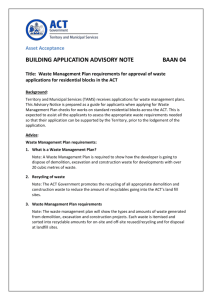




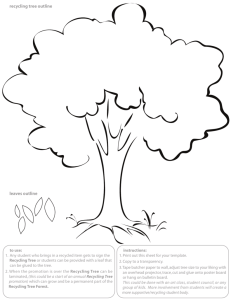

![School [recycling, compost, or waste reduction] case study](http://s3.studylib.net/store/data/005898792_1-08f8f34cac7a57869e865e0c3646f10a-300x300.png)
